|
|
|
Sort Order |
|
|
|
Items / Page
|
|
|
|
|
|
|
| Srl | Item |
| 1 |
ID:
116883
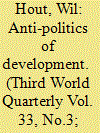

|
|
|
|
|
| Publication |
2012.
|
| Summary/Abstract |
This article discusses the attempt undertaken by several development aid agencies since the turn of the century to integrate political economy assessments into their decision making on development assistance. The article discusses three such attempts: the Drivers of Change adopted by the UK's Department for International Development, the Strategic Governance and Corruption Analysis (sgaca) developed by the Dutch Directorate General for International Cooperation and the new thinking on political economy analysis, policy reform and political risk advanced by the World Bank. On the basis of a political-economic interpretation of development agencies, two main factors are found to hinder the successful application of political economy assessment. In the first place, the agencies' professional outlook leads them to see development in primarily technical terms. In the second place, the nature of incentives for development professionals leads them to resist the implementation of political economy analyses.
|
|
|
|
|
|
|
|
|
|
|
|
|
|
|
|
| 2 |
ID:
116884
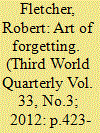

|
|
|
|
|
| Publication |
2012.
|
| Summary/Abstract |
This article explores the implications of a phenomenon that, following Renato Rosaldo's influential discussion of 'imperialist nostalgia', I call 'imperialist amnesia': the fetishistic disavowal of the legacy of European colonisation within contemporary postcolonial societies. I describe the manifestation of this amnesia in discourses as diverse as academic scholarship, international development and travel writing. Observing the recurrence of imperialist amnesia in the face of persistent attempts to historicise postcoloniality, I propose that the disavowal of colonialism functions as what Michael Taussig calls a 'public secret'-something commonly known but not generally acknowledged-helping to efface the grim realities of the colonial enterprise. Public secrecy by its nature defies most attempts at disclosure; hence efforts to publicise colonialism's contemporary influences may paradoxically reinforce their obfuscation by perpetuating the very imperialist amnesia they seek to dispel.
|
|
|
|
|
|
|
|
|
|
|
|
|
|
|
|
| 3 |
ID:
116888
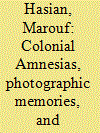

|
|
|
|
|
| Publication |
2012.
|
| Summary/Abstract |
This article provides readers with a biopolitical critique of the recent debates that have swirled around the renovations at the Royal Museum for Central Africa (rmca) and the 'Memory of Congo' exhibits. The author argues that the rmca has become a contested site of memory, where some older photographs that were once used in Congo Reform Movements have been reappropriated in (post)colonial disputes about the epistemic and demographic features of what Adam Hochschild has called the forgotten Congolese 'holocaust'.
|
|
|
|
|
|
|
|
|
|
|
|
|
|
|
|
| 4 |
ID:
116892


|
|
|
|
|
| Publication |
2012.
|
| Summary/Abstract |
It has become common to regard consociational democracy as a method of managing conflict in ethnically divided societies but little attention has been paid to its applicability to societies where the primary political cleavage is between secular and religious forces. This article seeks to redress this imbalance by examining the applicability of consociationalism to the case of the Palestinian Territory. We argue that, while Palestinian society is characterised by 'pillarisation' along a secularist/Islamist cleavage, formal power-sharing between the representatives of the two main Palestinian factions, namely Fatah and Hamas, has proved elusive. However, rather than seeking to explain the seeming inability of the factions to share power by reference to the nature of the cleavage, as other authors have done, we instead highlight the contextual factors that have made power sharing difficult to achieve, namely the difficulties Hamas and Fatah face in accepting each other as political partners, and opposition from external actors.
|
|
|
|
|
|
|
|
|
|
|
|
|
|
|
|
| 5 |
ID:
116889
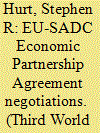

|
|
|
|
|
| Publication |
2012.
|
| Summary/Abstract |
This article focuses on the negotiation of Economic Partnership Agreements (epas) which form the central focus of the commitments made in the Cotonou Agreement, signed in 2000 by the European Union and the African, Caribbean and Pacific (acp) states. epas are part of a much wider trend witnessed since the creation of the World Trade Organization (wto), characterised by the proliferation of bilateral free trade agreements. The article argues that both the material and ideational interests of the EU need to be considered alongside the historical context of EU-acp relations. The EU is making a concerted effort to 'lock in' neoliberalism across the seven different sub-regions of the acp group by negotiating epas that include both reciprocal trade liberalisation and various 'trade-related' issues. In this way epas will go beyond the requirements for wto compatibility, resulting in a reduction of the policy space for acp states to pursue alternative development strategies. The article then considers the potential developmental impact of epas with reference to the negotiations with seven of the 15 member states of the Southern African Development Community (sadc). It is argued that the EU is promoting 'open regionalism', which poses a threat to the coherence of the regional project in southern Africa.
|
|
|
|
|
|
|
|
|
|
|
|
|
|
|
|
| 6 |
ID:
116882
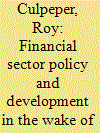

|
|
|
|
|
| Publication |
2012.
|
| Summary/Abstract |
Financial sector liberalisation has led to market failure on a massive scale. In industrial countries market failure led to the Great Financial Crisis that erupted in 2007 and continues into its fifth year. In developing countries liberalised financial markets have failed to provide access to financial services for the vast majority of households and firms. Small and medium-sized enterprises (smes), which are critical for employment, income creation and economic development, are particularly excluded by liberalised private financial markets. Market failure necessitates government intervention. To enhance smes' financial access requires an activist role by governments-not only by ensuring an enabling policy framework and financial infrastructure for smes, but also by supporting direct provision of financial services through national development banks and directed credit programmes. More broadly the crisis also provides an opening for a neo-structuralist development paradigm to replace the failed Washington Consensus. In this context activist financial sector policies should be integrated with industrial sector strategies.
|
|
|
|
|
|
|
|
|
|
|
|
|
|
|
|
| 7 |
ID:
116887


|
|
|
|
|
| Publication |
2012.
|
| Summary/Abstract |
Friedrich List's National System of Political Economy continues to be positively received in ipe, where it is treated as a seminal text in development theory. Only a handful of ipe scholars have questioned the specific history of economic ideas through which List asserted the distinctiveness of his own position. They do so by showing that he deliberately put words into the mouths of his classical political economy predecessors to provide himself with something to argue against. His alleged authority on development issues rests in particular on purposefully caricaturing the arguments of Adam Smith. I use this article to suggest a plausible reconstruction of the route to List's Smith, one which recognises the possible intermediary influence of the early Dugald Stewart, John Ramsay McCulloch, the Earl of Lauderdale and Georg Sartorius. By following this complex trail to List's rather eccentric Smith historiography, it becomes possible to break down one of the most important oppositions in ipe pedagogy: that between List's National System and Smith's Wealth of Nations. It also becomes necessary to engage more circumspectly with List's history of economic ideas when searching for the origins of contemporary critically minded development theory.
|
|
|
|
|
|
|
|
|
|
|
|
|
|
|
|
| 8 |
ID:
116891


|
|
|
|
|
| Publication |
2012.
|
| Summary/Abstract |
This article accounts for the conceptualisation of development by the Palestinian Islamist party, Hamas. It concludes that Hamas's position on development can be seen in either two ways: 1) as broadly similar to mainstream neoliberal development; or 2) as significantly different and an alternative type of development. Which view taken depends on whether an Orientalist or non-Orientalist approach to understanding development is employed (with Orientalism linking development, modernity and progress with the West and denying it to the non-West). While an Orientalist view assumes that development only occurs within narrow parameters, obliging the non-West to 'catch up', a non-Orientalist approach would study Islam on its own terms-and therefore see Hamas's approach to development as an alternative to mainstream thinking. To account for this, the article studies the basis of knowledge in Orientalism and Islamic thought alongside Hamas's rise from its foundation in 1987 to its control of Gaza in mid-2007.
|
|
|
|
|
|
|
|
|
|
|
|
|
|
|
|
| 9 |
ID:
116885
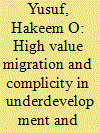

|
|
|
|
|
| Publication |
2012.
|
| Summary/Abstract |
Through a focus on the UK's 'High Value Migrants' programme, this article directs attention to how commercial migration laws and policies of developed countries could negatively affect the global South. Drawing mainly on insights from criminology and development studies, it investigates how the commercial migration laws and policies, specifically the aspects that deal with encouraging or attracting 'high-value' foreign entrepreneurs and investors, make the state potentially complicit in corruption and underdevelopment in the global South. There is an important need to address the implicated migration laws and policies as a critical and integral part of international efforts to combat corruption and promote peace and development in the global South. Reform of such laws and policies is in the long-term interest of all stakeholders.
|
|
|
|
|
|
|
|
|
|
|
|
|
|
|
|
| 10 |
ID:
116890
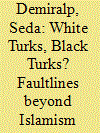

|
|
|
|
|
| Publication |
2012.
|
| Summary/Abstract |
According to popular views, contemporary Turkish politics is defined by the ideological conflict between Islamist and secularist parties. However, the focus on the Islamism versus secularism dichotomy, a common bias in the studies of Muslim countries, disguises a deeper faultline between the old urban elites and the newly rising provincial actors. This article highlights the need to see beyond the 'Islamism-secularism' divide and to consider the complex relations of power between alienated social groups in Turkey. It analyses the intricate and multi-layered forms of 'othering' in the urban secularist discourse, which perpetuates the inequalities and contention in society. Instead of taking the 'Islamism-secularism' divide as given, the article analyses the construction of secularist and Islamic identities and considers how this dichotomous discourse has empowered the urban parties to control the provincial. Finally, implications for the reconciliation of antagonised social groups are presented.
|
|
|
|
|
|
|
|
|
|
|
|
|
|
|
|
|
|
|
|
|